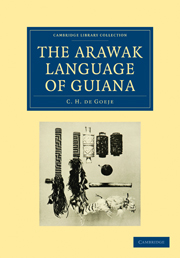Book contents
- Frontmatter
- Preface
- Contents
- List of literature
- Rules for pronunciation and abbreviations
- Alphabetical Index
- German words in Schultz' texts
- CHAPTER I Finite verb
- CHAPTER II Character of the Arawak words
- CHAPTER III Infinite verb
- CHAPTER IV Auxiliary verb a
- CHAPTER V Intensives, conjunctions, etc.
- CHAPTER VI K; B
- CHAPTER VII F; P; B
- CHAPTER VIII M
- CHAPTER IX N
- CHAPTER X D
- CHAPTER XI T
- CHAPTER XII Formation of verbs, etc.
- CHAPTER XIII L; R
- CHAPTER XIV H
- CHAPTER XV S
- CHAPTER XVI Vowels, diphotongs; colours
- CHAPTER XVII Classes of utterances; numerals
- CHAPTER XVIII Man
- CHAPTER XIX Foreign words. Arawak and Arawak-Maipure
- CHAPTER XX Origins of the Arawak language
- APPENDIX: Information collected in Surinam in 1907 and in 1928
CHAPTER XIX - Foreign words. Arawak and Arawak-Maipure
Published online by Cambridge University Press: 05 October 2010
- Frontmatter
- Preface
- Contents
- List of literature
- Rules for pronunciation and abbreviations
- Alphabetical Index
- German words in Schultz' texts
- CHAPTER I Finite verb
- CHAPTER II Character of the Arawak words
- CHAPTER III Infinite verb
- CHAPTER IV Auxiliary verb a
- CHAPTER V Intensives, conjunctions, etc.
- CHAPTER VI K; B
- CHAPTER VII F; P; B
- CHAPTER VIII M
- CHAPTER IX N
- CHAPTER X D
- CHAPTER XI T
- CHAPTER XII Formation of verbs, etc.
- CHAPTER XIII L; R
- CHAPTER XIV H
- CHAPTER XV S
- CHAPTER XVI Vowels, diphotongs; colours
- CHAPTER XVII Classes of utterances; numerals
- CHAPTER XVIII Man
- CHAPTER XIX Foreign words. Arawak and Arawak-Maipure
- CHAPTER XX Origins of the Arawak language
- APPENDIX: Information collected in Surinam in 1907 and in 1928
Summary
The Arawak language has appropriated several foreign words. The Spanish words may be regarded as such, and also the creole-Dutch words which occur in Brett's texts, and partly those in Schultz' texts. Brett uses a great many English words (as: hell, paradise, prophet, temple, angel, incense, praise, apostle, etc. etc.), and Schultz several German words (see list of these words at the end of the Alphabetical Index), but these may not be regarded as having been assimilated.
All these words are – see Alphabetical Index – expressions for post-Columbian ideas. Penard (17c) is of opinion “that there is a tendency, though not a strong one, to replace foreign words by others of Arawak origin. Taken all in all, the Arawak language of Surinam does not appear to have been affected so much, as close contact with civilization might lead us to think”.
The Arawak does not recognize foreign verbs as such; he makes an action-word from them, by means of the usual affixes:
From creole-Dutch words: B. a-dankido-(n-wa), to thank, S. a-lesedi-, to read;
From English words: B. a-baptizedi-, to baptize (baptism, baptism), a-circumcisedo-(n-wa), to be circumcised, a-praisedi-, to praise, a-prophesido-(n-wa), to prophesy, a-sacrificedo (-n-wa), to do sacrifice, a-sweardoa, to swear, a-ridi-, to read.
There is no direct proof that Arawak has appropriated words from other Indian languages. However, in Guiana and adjacent territories one often finds that a certain word for a pre-Columbian domestic article, a plant, an animal, or even a supernatural being, is used by tribes belonging to different families of languages.
- Type
- Chapter
- Information
- The Arawak Language of Guiana , pp. 210 - 235Publisher: Cambridge University PressPrint publication year: 2009First published in: 1928



